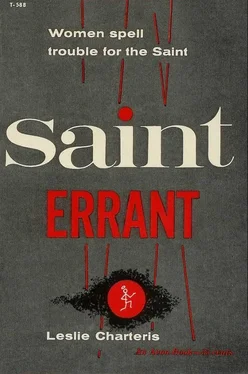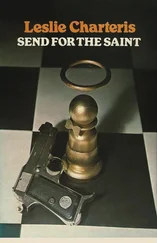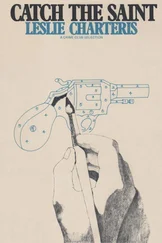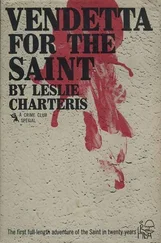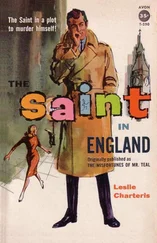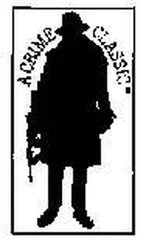Leslie Charteris - Saint Errant
Здесь есть возможность читать онлайн «Leslie Charteris - Saint Errant» весь текст электронной книги совершенно бесплатно (целиком полную версию без сокращений). В некоторых случаях можно слушать аудио, скачать через торрент в формате fb2 и присутствует краткое содержание. Год выпуска: 1954, ISBN: 1954, Издательство: Avon, Жанр: Крутой детектив, на английском языке. Описание произведения, (предисловие) а так же отзывы посетителей доступны на портале библиотеки ЛибКат.
- Название:Saint Errant
- Автор:
- Издательство:Avon
- Жанр:
- Год:1954
- ISBN:978-1477842874
- Рейтинг книги:3 / 5. Голосов: 1
-
Избранное:Добавить в избранное
- Отзывы:
-
Ваша оценка:
- 60
- 1
- 2
- 3
- 4
- 5
Saint Errant: краткое содержание, описание и аннотация
Предлагаем к чтению аннотацию, описание, краткое содержание или предисловие (зависит от того, что написал сам автор книги «Saint Errant»). Если вы не нашли необходимую информацию о книге — напишите в комментариях, мы постараемся отыскать её.
Saint Errant — читать онлайн бесплатно полную книгу (весь текст) целиком
Ниже представлен текст книги, разбитый по страницам. Система сохранения места последней прочитанной страницы, позволяет с удобством читать онлайн бесплатно книгу «Saint Errant», без необходимости каждый раз заново искать на чём Вы остановились. Поставьте закладку, и сможете в любой момент перейти на страницу, на которой закончили чтение.
Интервал:
Закладка:
The voice sank again, only momentarily. “This very morning you were exposed. The stranger here did it. He challenged you. I was listening. He made you show your gun. Does an honest man need a gun? And you could shoot. I watched. He told you that you were a liar when you said you traded in jewelry — because you did not know that the diamond on your finger was not real. And he said that perhaps the true reason why you left Chicago was because you were — on the spot. Perhaps you thought I did not understand. But we are not so ignorant. We also read newspapers. I know you, Amadeo! You are a gunman!”
He turned to the Saint.
“Is that not so?”
Simon nodded.
“That would be my guess.”
“So you thought you could swindle me,” Intuccio went on mercilessly. “But then you were exposed. You knew that after what I had seen and heard I should never trust you. You had to be quick, before I denounced you to the sheriff. This afternoon you were alone. You came back here. You! You took Lucia away! You wrote that letter! You are the man we want!”
Urselli’s gasp of fright as he was shaken as if he were a doll in the convulsive grasp of the huge hands that held him sobbed out against the fearful low-pitched growl of wrathful men. As the innkeeper’s voice rose uncontrollably, the murmur beat upwards like an angry sea. Other voices clanged against it, echoing clearer and louder in the vengeful cry of a wolf pack, soaring to drown every other sound, shouting against each other. The circle narrowed in, creeping out of the shadows into the full yellow of the smoking lamp, hands reaching out, throats snarling gutturally. “Lynch him! Lynch the swine!”
“Stop!”
The sheriff’s command boomed like a gunshot through the din. He turned to Urselli grimly.
“Reckon you better say something quick, friend,” he drawled.
Urselli’s face twisted and twitched, his hunted eyes swiveling frantically over the bank of remorseless faces. He shrank away like a cornered animal.
“It’s not true!” he blubbered. “I ain’t done nothing. Ya can’t frame this on me! This won’t help ya. That ransom’s gotta be paid by midnight — an’ if it ain’t there—”
The clamor which had been hushed began again. Fingers plucked at him. Red eyes glowered into his whichever way he turned. And all the time the innkeeper’s inexorable hands held him as helpless as a struggling child. Urselli screamed.
“Don’t touch me!” he gasped, writhing away from them. “You’re all wrong. You don’t know what you’re doing. Gimme a break. Don’t touch me! Salvatore — you wouldn’t let them do this to me? I’ll do anything — anything. Here, look. I told you I had twenty thousand bucks. You can have them. I’ll give them to you. Take them and pay the ransom!”
“What do you think. Salvatore?” asked the sheriff steadily.
Silence came down again, raw-edged and expectant. Intuccio turned. He shrugged, and the slobbering object in his grip rose and fell like a puppet with the heave of his shoulders.
“It is easy enough to pay ransom to oneself,” he said skeptically. “But I can take his money. If they will give Lucia back to me — if she is safe — afterwards we shall see.”
“We can all go with you,” spoke up one of the bystanders, and there was a chorus of assent. “If we can catch one o’ them thar coyotes—”
Others chimed in.
“Fools!” cried the old man bitterly. “If it were as easy as that, should I not have asked your company long ago? Lucia will not be there. They will keep her until the money is paid.” The fire smoldered again in his dark eyes. “But when I return, you, Amadeo, will still be here. And death pays for treachery. If Lucia does not come home, I will kill you myself.”
He tore off Urselli’s belt and flung it to the sheriff. Pack after pack of new crisp bills came from it, and the sheriff counted the pile and stacked it together.
“It is my duty to forbid this,” he said gravely. “But it’s — your daughter.”
Intuccio nodded stonily.
“Yes,” he said. “It is my daughter.”
He scanned their faces once, his eyes resting last on the trembling figure of Urselli held by two pairs of strong hands, and then he passed through them to the door, with the circle opening to let him through. And again the stillness began to be broken, voice by voice.
“I have an idea,” said the Saint.
He stood by the wall, a little apart from them, cigarette poised between lean brown fingers. The very quiescence of his lounging suppleness had the electric quality of a smoothly humming dynamo, but the light was too dim for them to see the reckless blue twinkle of his eyes. Yet they all looked at him.
“All of you couldn’t go,” he said quietly. “But one man might. I’ve done plenty of night hunting. I could follow — and see where the money was taken.”
“Could you be sure no one would know?” asked the sheriff, and Simon smiled.
“Anyone who heard me, or saw me, would be a living miracle.”
He had a way about him.
They listened to him.
He went through the night toward Skeleton Hill with a blithe softness. The country before him and on either side was an earthly sleeping wilderness, ragged and obscure in the shrouded darkness of a night without a moon. The cry of a hunting coyote somewhere in the distance wailed faintly through the veiled space, and the Saint smiled again. Presently, ahead of him, he heard the monotonous scrunch of plodding boots going down the dirt road. He came up swiftly with the sound, till he could see the ghostly bulk of the walker blotting out the stars.
He himself made no sound. He came up until his hand could stretch out and grip the man’s shoulder, and he spoke in a sudden gentle whisper of Italian.
“One moment, Salvatore. You know as well as I do that there is no hurry to reach Skeleton Hill.”
The man halted with a jerk, and turned. His black-bearded face bent forward till he could recognize the Saint in the vague starlight. Then the shaggy black head bowed.
“ Lai fatto molto bene ,” said the old man gruffly. “I thought we should meet here.”
For a moment even Simon was startled. “You guessed, did you?”
“I knew that Amadeo could never have been so stupid as to try anything like that immediately after you had shown him up. And the hunting trip that left him alone for nearly four hours was your idea. Also you knew that I had no money, so I knew that I had nothing to fear from you. Where is Lucia?”
“She went and hid in the woodshed as I told her to,” answered the Saint shamelessly. “I told her to slip out as soon as it was dark and come along here. You’ll probably find her a little way along the road. But if you knew, why did you help me?”
“I did not see why that Amadeo should have so much money,” said Intuccio calmly. “You will be content with half?”
Simon laughed softly.
“From the very beginning,” he said, “I always meant you to have three quarters.”
Intuccio took out the money and divided it.
“Do we go back?” he asked.
“I think we shall have to make some ingenious explanations,” said the Saint. “If Lucia says it was Amadeo, he will probably be lynched. As far as I’m concerned, the probability leaves me unmoved, but since he’s still your cousin you may feel differently. If she says it was me, I’m not likely to have such a good time either. Perhaps she had better invent somebody.”
“Let us decide about that on the way,” agreed Salvatore Intuccio, and they walked on, arm in arm.
Teresa
One more story that stems from long ago. From 1931, to be quite exact — although I didn’t write it for a longish while afterwards.
Читать дальшеИнтервал:
Закладка:
Похожие книги на «Saint Errant»
Представляем Вашему вниманию похожие книги на «Saint Errant» списком для выбора. Мы отобрали схожую по названию и смыслу литературу в надежде предоставить читателям больше вариантов отыскать новые, интересные, ещё непрочитанные произведения.
Обсуждение, отзывы о книге «Saint Errant» и просто собственные мнения читателей. Оставьте ваши комментарии, напишите, что Вы думаете о произведении, его смысле или главных героях. Укажите что конкретно понравилось, а что нет, и почему Вы так считаете.
